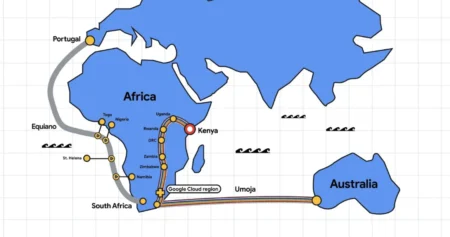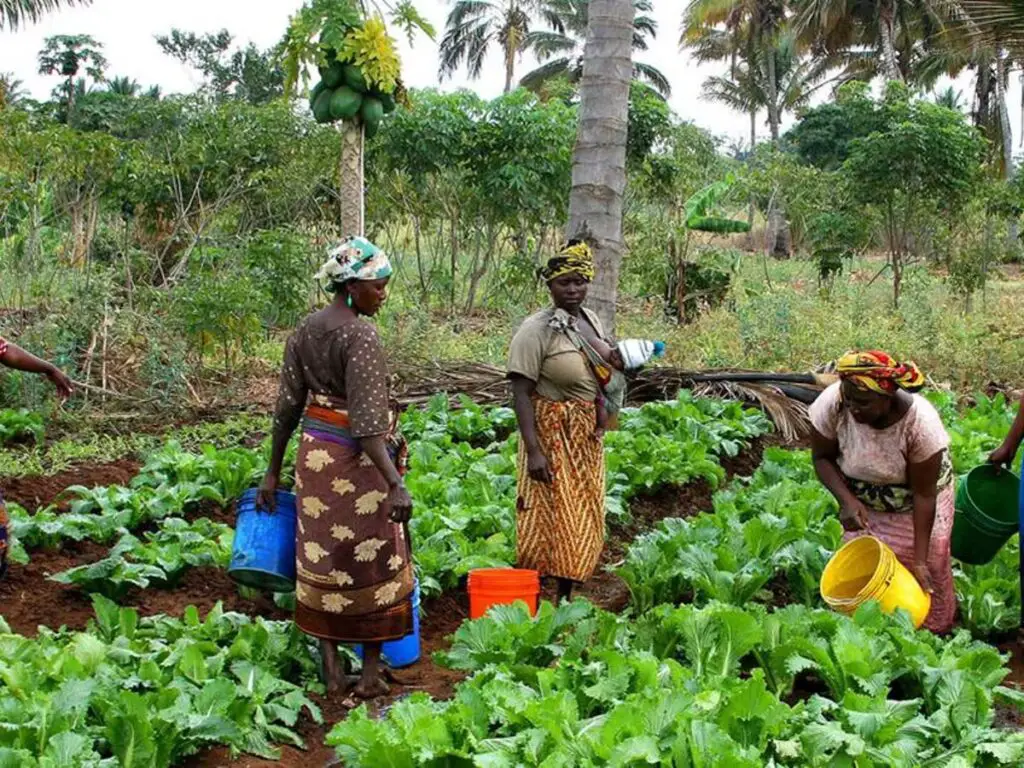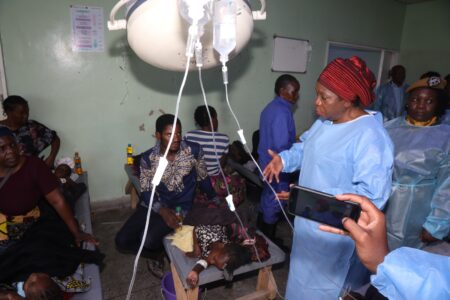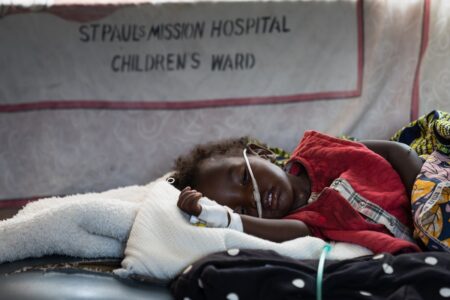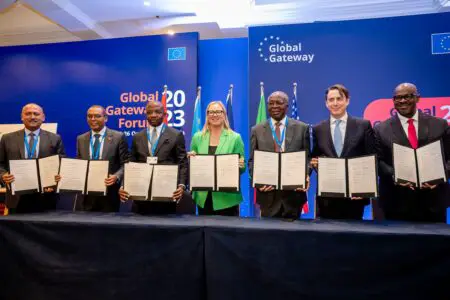- Africa’s new dawn: the rising role of digital and AI in agriculture
- Can Dangote Refinery Transform Africa Energy Ambition
- Gallup Survey: 80 per cent of Kenyan Workers Are Disengaged and Seek New Opportunities
- Madagascar Man Freed from 5KG Tumor After 15-Year Struggle
- How women in Africa are perceived and treated
- Sugar consumption in Kenya to Increase to 1.23 Million Tonnes
- Can Somalia and Turkey Oil deal Bring Change in Somaliland
- Remittances to Kenya dropped to $371.6 million in June, marking a six month low
Browsing: Zambia
- Google is rolling out Umoja cable, the first-ever fibre optic link directly connecting Africa with Australia, aiming to enhance global digital infrastructure and foster economic growth.
- The Umoja project, developed in collaboration with Liquid Technologies, will improve connectivity and drive digital inclusion across Africa.
- This initiative is part of Google’s long-term commitment to Africa’s digital transformation, with investments in infrastructure, cybersecurity, and AI innovation to support growth.
In a deal set to revolutionize digital connectivity across continents, tech heavyweight Google has announced the launch of Umoja, the first-ever fibre optic link directly connecting Africa with Australia. This project is poised to enhance global digital infrastructure, foster economic growth, and drive digital inclusion on a new level scale.
The Umoja cable, anchored in Kenya, will traverse a diverse array of African countries, including Uganda, Rwanda, the Democratic Republic of Congo, Zambia, Zimbabwe, and South Africa, before crossing the Indian Ocean …
- A total of 77 people, including 22 Chinese and a Cameroonian, all suspects in an elaborate cybercrime ring in Zambia targeting thousands of people across the world, have been arrested in a crackdown.
- Masquerading as call centre agents, Zambian youth were recruited into conning people via Telegram and WhatsApp platforms.
- Authorities in Zambia say the scam affected people in Singapore, Peru, the UAE, and some African countries.
In Zambia’s posh Roma district, the morning African sun barely peeked through the offices of Golden Top Support Services. This company had promised scores of respectable jobs to young Zambians as call centre agents.
Instead, it had covertly plunged them into the depths of a sprawling cybercrime syndicate. This chilling reality came to light following a decisive raid led by the country’s Drug Enforcement Commission (DEC), exposing a narrative that conjures up the global challenges of cybercrime.
This operation was a huge score …
- Expensive loans remain a significant issue across populations engaged in agriculture in Nigeria, Tanzania and Zambia.
- A report by the Alliance for Green Revolution in Africa (AGRA) says capital injection is a significant strategy agribusinesses use to survive.
- Moreover, agribusinesses face high operational costs from fuel prices and low-profit margins driven by currency devaluations.
The lack of agriculture-friendly financial systems saw agribusinesses turn down expensive loan options in the market, with only 15 per cent taking on commercial capital in 2023 and the rest sourcing capital from friends, family and their business savings.
The incentives by the government channelled towards agriculture failed to adequately cushion Agribusinesses from economic shocks, a new report by Alliance for Green Revolution in Africa (AGRA) has revealed.
The African Agribusiness Outlook survey is conducted annually to gain insights into the sector’s top priorities, how they address challenges, and what SMEs see as opportunities.
A reflection …
- Cholera fatalities in Zambia have now surpassed 150 cases since the onset of the latest outbreak in October 2022.
- Authorities are also prohibiting the sale of food along urban streets as Zambia cases hit past 4,000.
- A cholera resurgence in October has spread across the country, with reported cases spanning 16 districts across six of Zambia’s 10 provinces.
Authorities in Zambia have postponed the start of the 2024 academic year to January 29th, underscoring the escalating death toll attributed to the Cholera outbreak in the country. This drastic decision follows the alarming statistics of Cholera fatalities, which have now surpassed 150 cases since the onset of the latest outbreak in October 2022.
This rescheduling of school reopening reflects a prudent response to the risks imposed by the growing public health crisis, underlining the gravity of the situation gripping the southern African country and the necessity to prioritize the population’s well-being.…
- Airtel Africa CEO Olusegun Ogunsanya has retired and will be replaced by Sunil Taldar, the new Managing Director and CEO.
- For the six months ending on September 30, the group reported a net loss of $13 million,
- Mittal further announced Ogunsanya’s post-retirement role as the Airtel Africa Charitable Foundation Chair.
Airtel Africa CEO set to retire
Airtel Africa PLC has announced that Chief Executive Officer Olusegun Ogunsanya will retire on 1 July 2024 and take an advisory role.
Ogunsanya, who joined Airtel in 2012, ran the Nigeria Operations of the Telecommunications and Mobile Money Company for nine years before he was appointed Chief Executive Officer of the Group in 2021.
He led the company to maintain double-digit revenue growth and deliver new products to its customers across the continent.
Building on the work undertaken during his time as CEO, including the launch of the Company’s first Sustainability Strategy, and given …
- They will also receive comprehensive mentorship and coaching as part of a 12-month accelerator program.
- This year’s focus was on female-owned enterprises pioneering Fourth Industrial Revolution (4IR) technologies such as artificial intelligence, big data analytics, virtual reality, robotics, IoT among others.
- The winning ventures, led by women from across Africa, focus on sectors affected by climate change.
African enterprises have triumphed in the 2023 YouthAdapt challenge, with eight dynamic women-led businesses securing victory. Each of these enterprises is set to receive grant funding of up to $100,000.
They will also receive a comprehensive mentorship and coaching as part of a 12-month accelerator program. Since its launch in 2021, the YouthADAPT initiative has provided more than $5 million to 33 young entrepreneurs from 19 African nations.
Jointly organised by the African Development Bank Group (AfDB) and the Global Center on Adaptation, supported by the Africa Climate Change Fund, YouthADAPT is …
- Kenya’s Bluewave Insurance Agency has announced plans to raise $6 million to expand into five new African markets to increase insurance penetration in markets characterized by low uptake.
- Company Founder and CEO Adelaide Odhiambo says the investment would be raised over the next three years.
- The insurer is partnering with Mobile Network Operators and banks to distribute affordable micro-insurance products, with plans to enter Uganda, Nigeria, Ethiopia, Malawi, DRC, Tanzania, Rwanda, and Zambia.
Kenya’s Bluewave Insurance Agency has announced plans to raise $6 million as the firm seeks to expand into five new African markets, aiming to increase insurance penetration in regions characterized by low uptake. Adelaide Odhiambo, Founder and CEO of Bluewave Insurance Agency, stated that the investment would be raised over the next three years to support the expansion plans.
Bluewave Insurance Agency’s new target markets
The company has forged partnerships with large aggregators, specifically Mobile Network Operators …
- The government has announced a reduction in interest rates on student loans in Zambia from 15 per cent to 10 per cent, effective January 2024.
- The cost of pursuing higher education can be a significant financial burden for many students and their families.
- In Zambia, there are several options. Universities are offering student loans to fund education, and one of the most common methods is through student loans.
In a significant move aimed at easing the financial burden on students, the Zambian government has announced a reduction in interest rates on student loans from 15 per cent to 10 per cent, effective January 2024. The announcement was made by Douglas Syakalima, Zambia’s Minister of Education, during a media briefing held on Monday, November 27, 2023, at his office.
The decision to lower the interest rates comes after extensive consultations between the government, facilitated through the Higher Education Loans and Scholarship …
A groundbreaking initiative, the SEMA ReACT (SEvere MAlaria treatment with Rectal artesunate and Artemisinin-based Combination Therapy [in remote settings]) consortium, marks a fresh collaboration between Africa and Europe. This study addresses the knowledge gap surrounding an intervention designed to provide a critical time buffer for seeking additional care in remote settings where transferring to health facilities is difficult.…
The Lobito Corridor represents a significant transport infrastructure project in Africa. The project will now become a reality with the backing of the US. Moreover, this is one of the projects through which Washington seeks to strengthen its investment ties on the continent. This project entails a transportation network that links northwest Zambia to Angola’s Benguela railway, ultimately connecting to the strategic Lobito port, the second largest seaport in oil-rich Angola.…





